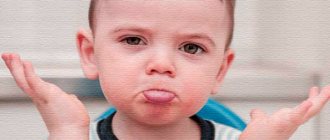Article:
In older preschool age, all mental functions and cognitive processes are aimed at improving speech skills.
A 6-year-old child has a large vocabulary, answers questions in detail, logically and consistently expresses his desires, experiences, thoughts, and also pronounces all sounds correctly and uses complex sentences. All this is necessary for further education at school. In the article we will talk about the features of this age, exercises to improve all its components, methods of teaching reading and writing.
Peculiarities of speech development in preschoolers aged 6–7 years
All components of speech - vocabulary, grammatical structure, pronunciation, coherence - reach a new level, because they form the foundation for successful study.
Guys' vocabulary
The first criterion for assessing speech development. Preschoolers know from 4 to 7 thousand words. Of these, they use 70% constantly. Words from the passive dictionary are not used because they do not understand their meaning.
The guys know the names of the days of the week, months, holidays, seasons, cities; quantities up to 100; professions, sports; names, other information about relatives; body parts, colors, shades; natural phenomena; Houseware; plants, animals; can name emotions, feelings.
The grammatical structure of sentences
The second criterion for assessing speech development. The guys speak in full, complex sentences. There are mistakes in their speech, but rarely. They make up new words from others, change them by gender, case, and number. They cope with the formation of complex forms of nouns, verbs, and adjectives.
Children's speech coherence
The third criterion for assessing speech development. Preschoolers speak consistently, coherently, and logically. Conduct a monologue or dialogue. They fantasize a lot and write vivid stories. They can retell the plot of a book or film, or compose a fascinating story based on pictures.
Phonetics: pronunciation of sounds
The fourth criterion for assessing speech development in children 6–7 years old. The children not only pronounce sounds correctly, they can isolate them in the flow of speech and determine their location in a specific word. They select words that begin with a given sound and distinguish words that sound similar (“cancer” - “poppy”). But there are still difficulties in distinguishing paired “w” - “w”, “ts” - “s”, “s” - “w”. They distinguish and control the timbre and volume of the voice, determine the source of noise, and depict the sounds of nature and animals. They can divide words into syllables and distinguish consonants from vowels.
Sufficient development of speech and all its components lays the foundation for further learning to read and write.
Norms of speech development
Here are the standards established for speech development in children 6–7 years old:
- Vocabulary - 4000 - 7000 words. Of these, nouns predominate;
- Can select antonyms and synonyms;
- Speaks in complex, complex sentences;
- A 6-year-old child agrees and combines words according to their meaning;
- Speaks expressively, emotionally, understands, uses interrogative and exclamatory forms;
- Uses conjunctions;
- Speech is coherent, logical, consistent;
- Pronounces all sounds clearly, does not “swallow” the endings of words - articulation is good;
- Understands figurative expressions, such as “sunny smile”;
- Declines according to gender, number, case of a word;
- Highlights the main thing in the story, the secondary can be omitted;
- Retells the plots of books and films - meaningfully, succinctly, logically;
- A 6-year-old child can explain the meaning of a familiar word;
- Forms nouns with suffixes, verbs with prefixes;
- Operates with comparative, superlative degrees of adjectives, composes them (for example, “deep - deeper - deeper - deepest - deepest of all”).
- Understands and can evaluate the emotion he is experiencing;
- Selects the 4th extra.
A 7 year old child can construct sentences of any complexity, writes and reads syllable by syllable.
Speech development in children aged 6–7 years occurs during play. They fully use it as a means of communication with peers and adults. At school, it will become a means of mastering a new type of activity - educational. This is why it is so important to develop skills from early childhood.
Literature on the topic for parents
Familiarity with books is of utmost importance in speech development. The teacher suggested selecting Russian fairy tales for preschoolers:
- Pushkin;
- Tolstoy;
- Ershova.
Required reading
Also, the parent should read poems by Pushkin and Bazhov to the preschooler. Tikheyeva gives advice on teaching children to retell and teach them poetry.
Shakhnarovich A. M.
Shakhnarovich “Children’s speech in the mirror of psycholinguistics” is a collection that will help you know about various problems of speech analysis. The materials discuss such aspects of psycholinguistics as the connection between thinking and speech, thinking and communication, communicative and cognitive in speech development.
Timely diagnosis and competent correction will help to effectively correct speech defects in the baby. This will help prepare him for school. The main thing is to understand why the problem exists and solve it.
Speech development disorders and their prevention
Most often in older preschoolers these disorders manifest themselves in incorrect pronunciation. There are several types of violations:
- dyslalia - incorrectly pronounces individual sounds, which is quickly eliminated with the help of a speech therapist;
- dysarthria - articulation and voice formation are impaired, the help of a neurologist is needed;
- rhinolalia - incorrect pronunciation of sounds, the voice is monotonous, slurred, the help of an otolaryngologist is needed;
- motor alalia - children understand everything, but cannot speak coherently, incorrectly agree words by gender, number, case;
- sensory alalia - children do not understand the meaning of words addressed to them, they need the help of a neurologist, psychiatrist, speech therapist-defectologist;
- aphasia - a disorder due to neuroinfection or traumatic brain injury;
- reactive mutism - the child used to speak, but then abruptly stopped due to a neurological disease;
- stuttering - lack of fluency of speech, a 6-year-old child repeats syllables and sounds, speaks intermittently.
Another group is speech delay (SD) against the background of mental disorders (MD).
Prevention of disorders by a speech therapist
To prevent problems in a 7-year-old child, it is necessary to develop him from early childhood: talk to him, show him, name objects, read fairy tales, nursery rhymes, sing songs, develop fine motor skills.
The help of a speech therapist would be helpful. It helps the little patient develop articulatory and fine motor skills; cognitive processes, skills of analyzing what is heard.
Causes
Delayed speech development in children aged 5 years is not uncommon. Typically, speech disorders are expressed as follows:
- Violation of sound pronunciation.
- Speech disorders are caused by hearing problems.
- The pace and rhythm of speech are impaired.
- Due to developmental delays, the child loses his existing pronunciation.
Let's look at the most common causes of delayed speech development.
- Organic – disruption of the nervous system occurred in utero. This could be: a malocclusion, a short frenulum, the structure of the articulation apparatus, sparse or small teeth, a massive or narrow tongue.
- Functional – the mental characteristics of the child, as well as the specifics of his development.
Speech development of preschoolers 6 – 7 years old: improving coherence
Use every opportunity to improve the quality of your son or daughter’s speech.
Create a favorable environment around your child. Children learn their native speech by ear, so you must speak correctly and competently. Remember: you are a model for your daughter or son, and he will imitate you.
Teach your child to art - literature, theater. A good way is to learn rhymes and songs. Read good books together, listen to plays in audio format, go to the theater. Don’t forget to discuss what you saw and read. You will be surprised how quickly your baby’s speech will become more meaningful, richer, and more varied.
Here are some more simple exercises.
Dreamers. Give your child a topic and let him come up with a story (for example, “When I grow up...”, “If I had a magic wand...”).
Wimmelbook story. Buy your child a colorful book with pictures and no words. Let him make up stories about the characters.
We write, we draw. Come up with a story together, write it down, draw pictures for it.
To improve the speech of a 7-year-old child, you don’t have to take him to developmental classes - you can study at home, because it’s so interesting!
A set of games for speech development for 6 – 7 years old
“What does the word mean?” The parent names the objects, the child groups them: for example, table - furniture, plate - dishes.
"What is a name?" They ask you to name your name, mom, dad, friends.
"Who's doing what?". The adult invites the child to look around and say who can sleep, sit, walk, and what can ride and sound.
“Say the word.” The parent calls the sound to the baby, and he says the words that begin with it. Then, using the same analogy, names.
"Count the syllables." The adult names the words, and the preschooler’s task is to count how many syllables are in each of them.
“We swim, we fly, we go.” A parent shows his son or daughter pictures of transport. The task is to say what each of them is doing (the plane is flying, the bus is driving).
"Solve the puzzle." Mom suggests any topic (transport, fruit), thinks of a word, says the first and last letter. He must guess what word the adult said.
“Tell me.” The parent asks the child to tell about his favorite fruit so that the adult can guess it.
Adults can come up with such games for speech development for 6-7 year olds on their own.
Learning to write and read
Moms and dads strive for their child to learn to read and write as early as possible. But psychologists and neurologists do not recommend doing this. Firstly, the child must master new skills in a timely manner (and earlier does not always mean better), and secondly, children need to be taught using a special method. It is owned by kindergarten teachers and primary school teachers, but parents can make many mistakes and only harm their child.
Instead, focus on preparing to master new skills.
Learn sounds. Moms and dads often teach their children letters, but this is wrong. Words are built not on letters, but on sounds.
Train your articulation apparatus. This is the key to correct pronunciation.
Learn to write in block letters, not in capital letters. Schools use the continuous writing method. Other techniques will only do harm; the student will have to relearn, and this is much more difficult.
Get your little hand ready to write. Let him draw, cut out, hatch, paint, put together a mosaic, draw dots on checkered paper - this trains fine motor skills, muscles, and develops spatial orientation.
Let's talk separately about the sound-letter analysis of words. This is where preschoolers begin to be taught to read.
Learn to read step by step
Stage one - learning sounds.
- Start by learning a group of sounds. Use a primer or alphabet - learn in the same sequence.
- Tell us about vowels and consonants. How to pronounce them (drawn out, abruptly), how they differ.
- Tell us about syllables. Show how you can make a syllable from two sounds. Talk about the difference between letters (they are written) and sounds (they are pronounced). Show examples, for example “ma”, “sha”, “ra”, “ma”.
- It is correct to teach your child: “b”, “p”, “v”, and not the letters “be”, “pe”, “ve”. Otherwise, the daughter or son will read letter by letter: “Me - a - sha - a”, place “Ma-sha”. It will be more difficult and longer for him to learn to read by syllables, then by words. Complex words will even look like puzzles: “a - ve - te - o - be - y - es” instead of “av-to-bus” is much more difficult to perceive.
Stage two - read:
- We learn to combine sounds into syllables. Task for the baby: pronounce the first sound in the word until he reads the second: “m-m-m-m-a-a”;
- Finding syllables in a word. Assignment: ask your son or daughter to find certain combinations of letters in a word. Let him read them;
- We make up new words. Ask your child to make up a few words from familiar syllables and read them;
- Adding sounds. The baby adds one sound to familiar syllables, reads, composes new syllables, words;
- Learning to read closed syllables. First, show the difference between an open (“ka”) and a closed (“an”) syllable.
If the preschooler has completed these stages successfully, you can complicate the task - move on to more complex words, and then to sentences.
Pay attention to the fact that the child puts the emphasis correctly and understands the meaning of the words read. If he doesn’t understand, explain. Practice in the form of a game.
Communication problems in a child 3-10 years old
A practicing family psychologist is often approached by parents who observe that their children aged 3-10 years have difficulty communicating with peers: in kindergarten, class, some thematic section, or just in their own yard. The problem is described stereotypically: “Although my child has been attending this kindergarten group or this class for a year now, he/she has difficulty being accepted into the team. The child wants to be played with, but:
— he/she is embarrassed to ask the children to play a game;
- even after entering the game and playing with children for a long time, he does not know how to establish friendly relations with them that last for a long time;
- does not want to play by the rules of other children, and other children refuse to play by his rules;
- trying to attract other children with some special toys (rare, expensive, prestigious), he is faced with the fact that other children treat him/her clearly as a consumer: they played with his/her toys, then lost interest in their owner (or even tried to take away or appropriate);
- is very emotional because he/she does not have permanent friends, gets upset and even cries;
- not having friends among his peers, he tries to communicate either with younger children (organizing them around himself, manipulating them) or with older children (submitting to them and becoming an object of manipulation on their part), etc.
To help this child and his parents, it is important to understand:
The behavior of a child under ten years of age is determined by 70%
his genetics and the behavior of those adults with whom he is in contact.
This is after reaching the age of ten, the child’s behavior can be influenced by his high or low level of reading and education, the formation of his own, deeply personal worldview, goals in life, the influence of sex hormones, falling in love, the environment of a particular school or neighborhood, unique life experience, etc. .d. With a child - a preschooler, and a first-grade schoolchild, everything is much simpler. The principle works here: “an apple doesn’t fall far from the tree.”
Difficulties in communication of a child 3-10 years old with peers are associated
with the peculiarities of his genetics and the behavior of his relatives.
More specifically, the most typical reasons for difficulties in communication of a child 3-10 years old with peers are 100%, the reasons for this phenomenon are usually the following:
Thirteen main problems in communication of a child aged 3-10 years in a group of peers:
- A phlegmatic or melancholic temperament, or certain psychological “highlights” that the child inherited from his mother, father or grandparents, who in their lives (especially in their youth) were also always obvious loners, experienced difficulties in interpersonal communication. Here it is important to understand that the basis of communication and play of children 4-10 years old is not intellectual, but primarily physical activity. Hence, quite logically, priority is given first of all to those children who are the most active, courageous, noisy, inventive and enterprising. The rest are forced to stand on the sidelines. This also includes the preservation of certain oddities and characteristics in parents already in adulthood. Which also affects their children. For example, in my practice there are many situations where vegetarian parents prohibit their children from eating “like everyone else” in their group or class. Of course, other children do not seek to communicate with such, in their opinion, “strange” children. Or when parents prohibit their children from visiting health centers with other children (for example, vaccinations and medical examinations), or for religious reasons refuse some common group or class activity. I ask that adults understand:
Self-isolation of parents from the surrounding society
almost always leads to isolation of their children from their peers.
Adults are proud of their self-isolation, but their children suffer.
- The age of mom and dad, as well as their friends, is too old. Such adult parents are too afraid for their child, so he is not ready for real life, he simply does not know it. Since older parents rarely allow their child to walk on the street, they rarely walk with him in places that are new to him, where it is possible to communicate with children who are new to him, hence the problems with communication. For people after forty, everything is often too sedate and decent, and the campaign either has no friends at all, or again everything is quiet and peaceful. Not being morally prepared for children's nonsense and unexpected insults, such a “little adult,” accustomed to honesty and prudence, is shocked by the behavior of his friends in kindergarten or school, and is therefore incompatible with them.
- The child does not have an “entry ticket” to the world of communication with peers, that is, any specific toys, gadgets or accessories that are characteristic elements of children’s communication in a given children’s group. Without having their own toy, which is prestigious or obligatory, a child does not have the opportunity to exchange (as economists would say, goods and services) with other children on an equal basis, and therefore they are simply not interested. Moreover, in this case, it is not necessary that the child’s family is very poor. It’s just that parents, for some reason of their own (usually because of ridiculous educational concepts, banal stinginess or alcoholism) do not consider it necessary for the child to correspond to his social environment.
- The child is alone in the family, his parents love him very much and fulfill all his whims, living according to his requests, commands and instructions. The child gets used to only such communication where he is obviously a leader and manager, without encountering any resistance to this, often completely lacking those leadership qualities and competitive skills, without which a real leader is impossible. Therefore, habitually trying to impose his own rules of play and communication in a group, class or yard, such a child unexpectedly encounters resistance that is incomprehensible to him (after all, I’m such a good guy!), or even complete ignorance of his actions.
- In principle, adults have very little contact with the child: his parents, grandparents, brothers and sisters. This happens either because they all work very hard and technically do not have time to do this (communicating for an hour or two a day and only formally), or they are already at the age of forty and older, and therefore it is already physically difficult for them to maintain the necessary for full communication with a child, a high pace of physical activity: running, jumping, climbing, etc.
- The child is psychologically very squeezed by his parents or grandparents. He/she has been “educated” so much, making him/her a “model child”, that he/she is not able to relax with children, and ordinary children cannot play with the young “frozen” refined intellectual.
- The child, on the contrary, is so poorly brought up or has some nuances of mental state that the surrounding children are frankly afraid to get involved with him/her.
- The child became a victim of a psychologically difficult situation in the family. If his parents or relatives living with them regularly shout, swear, insult and beat each other, this can also lead to the child being downtrodden or, on the contrary, daringly disinhibited. What may interfere with their adaptation to the team.
- Gender-role stereotypes in the child’s understanding of the world are violated. For example, if the father in the family is squeezed (even if he earns more) by a tougher and stronger-willed mother, their little son may be inclined to be friends with girls rather than boys. After all, what's the point of being friends with boys if the main ones are still girls? So you need to be friends with them. If a little girl is active by temperament, wants to play dynamic games with her dad, but her dad is suppressed by her mother, who prohibits hide-and-seek in an apartment that is small or crammed with valuables, the girl will be a “tomboy” and will strive to play in a group with boys. Especially if the mother either looks extremely bad and doesn’t take care of herself like a woman, or, on the contrary, she’s all about herself and doesn’t have time to communicate with her daughter.
- An incomplete family, when a child has little contact with only one very busy mother (work, personal life or addictions), or with grandparents, who, due to age-related changes in health and psyche, are no longer able to provide the child with the necessary level of activity and information about world.
- It is too early, or, conversely, too late (usually too early) for a child to enter kindergarten or school, when the child’s development is clearly either behind or ahead of the general level of development of other members of the children’s team.
- Transferring a child from one group to another, from one kindergarten to another, from one class to another, from one school to another, contrary to his mood, with the immediate severance of his personal ties with existing friends. Which creates problems in communicating with a new society.
- The child’s poor knowledge of the language spoken by members of his team. In this case, it is important that the parents themselves actively master this language and the corresponding culture. If this does not happen, if there is one world in the family, and everything is different in the children’s team, conflicts between children will be very difficult to avoid.
Please note: Physical problems of a child (with speech, motor functions, etc.) are increasingly less likely to create communication difficulties for him. Since the appropriate level of medical, psychological and pedagogical correction is gradually becoming better. Plus, these problems are solved by placing the child in specialized preschool or educational institutions.
These are the most typical and common reasons. Having them before their eyes, possessing adult intelligence and - most importantly - objectivity and self-criticism, parents can easily find out the reasons that relate specifically to their child and themselves. Moreover, most often, there is usually a complex of two or three reasons at once.
Parents can be creative and, even without a family or school psychologist, independently eliminate the reasons that prevent their child from becoming an organic part of their children's team and getting comfort from communicating with peers. Including:
— Provide the child with interesting toys and modern gadgets at the level that is accepted in his children's group. Do not skimp on the child and do not create your own psychologically dubious pedagogical concepts.
- Play with him for at least an hour every day. Moreover, it is to play, and not to do homework, ask about his affairs or feed him. Don’t be afraid to play active and physically demanding games at home, as well as outside.
— Go out more often to visit such married couples of friends who also have children of a similar age, or invite them to visit you. And even better - not just sit at festive tables with food and drink, but go out together into nature, fishing and hunting, work in the country, go shopping together, to the gym, to a cafe or cinema, go on vacation with several families, etc. . Even sometimes take your child with you to work. So that the child sees living examples of how adults communicate with each other, and learns to imitate them.
— In general, try to have younger and physically active married couples with children among your friends. For whom having a child of their own is not yet a priority, next in importance to a mortgage, career, interesting leisure activities, etc. And it is their calm, and not emotionally overheated, attitude towards the child that will help you (if you are very adult parents) to build a pedagogical correct, that is, a reasonable-average attitude towards your child, will help you avoid parental pedagogical extremes that are dangerous for him.
— Go out as a family to public places more often, from your own yard, embankments, playgrounds near schools, to children's leisure centers and picnics in nature. At the same time, in the presence of the child, getting to know other adults, communicating positively with them and organizing joint activities. Also, in every possible way stimulating his own acquaintances with other children, helping him in this. Teaching him how to treat other children with treats and share toys with them, and how to stand up for himself in a correct way.
- If you are not a family of poorly educated gopniks, alcoholics or criminals, exclude scandals and conflicts in your family, especially assault. And not only in the presence of a child, but in general! After all, a child always perfectly senses the psychological situation in the communication of his parents and relatives. If there are serious problems in the interpersonal communication of spouses in the family, consult a family psychologist. And then you will not need his help in correcting the child’s behavior, you will not lead him to self-isolation from the team, depression or suicide.
— If one of your relatives living with you has a bad influence on your child, find an opportunity to live separately from them. If dangerous pedagogical excesses are characteristic of one of the grandparents or relatives, under a plausible pretext, reduce this communication. Remember:
Love your child and help him successfully find his place in society
and in life in general - unfortunately, these concepts do not always coincide.
— Do not rush to send your child to one or another kindergarten group or first grade school if the child is still clearly behind most children in his personal psychological development. I emphasize, as a psychologist: not in the intellectual (here everything is usually normal), but in the personal. Already quite smart, but simple-minded, a child often becomes easy prey for older children (and even six months at the age of 3-8 is a lot), which creates discomfort for the child.
- Do not change the child’s usual team without very important reasons, simply at the whim of the parents, of course, who want “only the best” for their child.
— Having his own deep personal or ideological characteristics, he does not strive to show them to his child at an early age, much less to impose them on him. Especially if they are not the norm for his team, and the parent wants the child to be accepted by the team.
— If possible, send your child to sports sections where group work takes place, rather than individual work. In this sense, football, basketball, volleyball, hockey, handball, rugby, cheerleading, synchronized swimming (etc.) will always take precedence over various martial arts and individual sports. Since they not only build character, but also teach them to successfully adapt to the rules of life in a team, which then helps in real adult life.
In general, you can see for yourself: there is nothing complicated in understanding the causes of children’s difficulties! If you need help, they will always consult with you, both the parents and your child.
Sincerely, Your family psychologist, Andrey Zberovsky
Contacts: www.zberovski.ru. Email: [email protected]
Make an appointment for a personal appointment and remote consultation
(phone, viber, whatsapp, skype): +7 902 990 5168, +7 926 633 5200.











